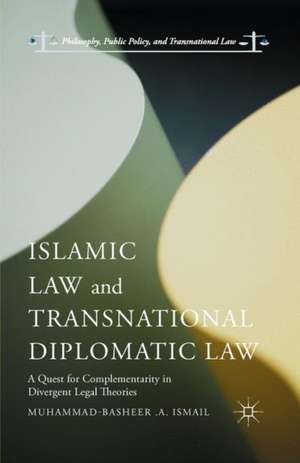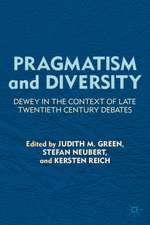Islamic Law and Transnational Diplomatic Law: A Quest for Complementarity in Divergent Legal Theories: Philosophy, Public Policy, and Transnational Law
Autor Muhammad-Basheer .A. Ismailen Limba Engleză Paperback – 25 feb 2017
| Toate formatele și edițiile | Preț | Express |
|---|---|---|
| Paperback (1) | 385.25 lei 6-8 săpt. | |
| Palgrave Macmillan US – 25 feb 2017 | 385.25 lei 6-8 săpt. | |
| Hardback (1) | 391.40 lei 6-8 săpt. | |
| Palgrave Macmillan US – 12 ian 2016 | 391.40 lei 6-8 săpt. |
Preț: 385.25 lei
Nou
Puncte Express: 578
Preț estimativ în valută:
73.74€ • 80.13$ • 61.98£
73.74€ • 80.13$ • 61.98£
Carte tipărită la comandă
Livrare economică 21 aprilie-05 mai
Preluare comenzi: 021 569.72.76
Specificații
ISBN-13: 9781349564163
ISBN-10: 1349564168
Pagini: 280
Ilustrații: XVII, 280 p.
Dimensiuni: 140 x 216 x 16 mm
Greutate: 0.35 kg
Ediția:1st ed. 2016
Editura: Palgrave Macmillan US
Colecția Palgrave Macmillan
Seria Philosophy, Public Policy, and Transnational Law
Locul publicării:New York, United States
ISBN-10: 1349564168
Pagini: 280
Ilustrații: XVII, 280 p.
Dimensiuni: 140 x 216 x 16 mm
Greutate: 0.35 kg
Ediția:1st ed. 2016
Editura: Palgrave Macmillan US
Colecția Palgrave Macmillan
Seria Philosophy, Public Policy, and Transnational Law
Locul publicării:New York, United States
Cuprins
1. Introduction
2. Historical Overview of the Universality of Diplomatic Practice
3. Sources of Islamic and International Diplomatic Laws: Between Tension and Compatibility
4. A General Overview of Diplomatic Immunity In International Diplomatic Law and Islamic Law
5. Diplomatic Immunities in Muslim States: Islamic Law Perspective of Muslim State Practice
6. Terrorist Attacks on Diplomatic Institutions: Jihaad and Islamic Law View Points
7. Conclusion
2. Historical Overview of the Universality of Diplomatic Practice
3. Sources of Islamic and International Diplomatic Laws: Between Tension and Compatibility
4. A General Overview of Diplomatic Immunity In International Diplomatic Law and Islamic Law
5. Diplomatic Immunities in Muslim States: Islamic Law Perspective of Muslim State Practice
6. Terrorist Attacks on Diplomatic Institutions: Jihaad and Islamic Law View Points
7. Conclusion
Recenzii
'Dr. Ismail shows how Islamic law and international diplomatic law are mutually reinforcing and largely complementary. Where there is divergence, there can be harmonization: the nature of his project is conversation, not conflict. Dr. Ismail has produced a rigorous work that blends theoretical inquiry and examples from Muslim State practice. This is an important contribution to the existing scholarship that, it is hoped, will enhance compliance in the area of diplomatic privileges and immunities.' - Robert P. Barnidge, Jr., Lecturer and Coordinator of International Relations, Department of History, Politics, and International Relations, Webster University, USA
Notă biografică
Muhammad-Basheer .A. Ismail currently lectures international law and Islamic law of transactions at the College of Law, Osun State University, Nigeria. He attended University of Hull, UK where he obtained Doctorate degree in international law. He received his LL.B (Islamic and Common Laws) and LL.M degrees from Bayero University, Kano and Obafemi Awolowo University, Ile-Ife in 1991 and 2001 respectively. He was enrolled as a Barrister and Solicitor of the Supreme Court of Nigeria in December 1992. He is an experienced Barrister and Solicitor of the Supreme Court of Nigeria having widely practiced law at all levels of Courts ranging from the Magistrate, High Courts through to the Supreme Court of Nigeria.
Textul de pe ultima copertă
The book explores the compatibility of Islamic law and international diplomatic law, aiming to maximize diplomatic protection in Muslim states by invoking Islamic law in support of international diplomatic law at national level. The author investigates the concept of diplomatic immunities and privileges under Islamic law and modern international law in theory and practice. The core of the book engages theoretical analyses of the two legal systems with a view to ascertaining the presence of any compatibility or tension in their respective principles on diplomatic law and then, examines the practices of some Muslim states within the context of that theoretical analysis. Ismail proposes that two legal systems are compatible and can be harmonized to enhance the concept of diplomatic immunities and privileges in Muslim states. The book facilitates a better understanding of the relationship that exists between Islamic diplomatic law and international diplomatic law with the hope to ultimately maximize diplomatic protection by clarifying and developing Islamic diplomatic law, which may eventually complement international diplomatic law.






















